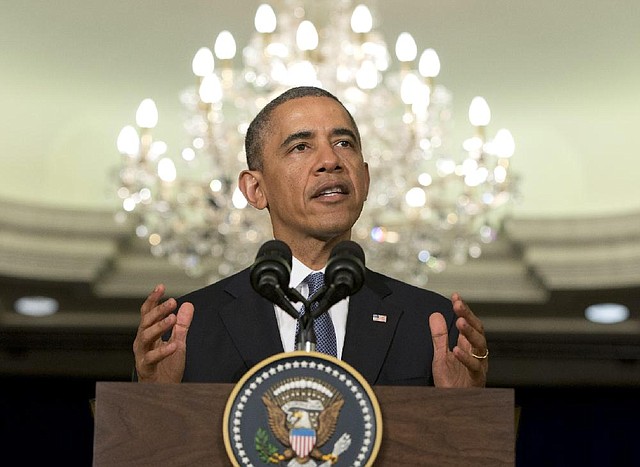Obama rebuts his foreign-policy critics
President Barack Obama speaks before participating in the signing of major commercial agreements with American businesses at the Ritz-Carlton in Kuala Lumpur, Malaysia, Monday, April 28, 2014. (AP Photo/Carolyn Kaster)
Tuesday, April 29, 2014
President Barack Obama laid out a full-throated defense of his administration’s foreign policy, pushing back against lawmakers and analysts who have criticized his response to crises in Syria and Ukraine.
Using his four-stop tour of the Asia-Pacific region as evidence, Obama said U.S. ties with allies are stronger than they were before he took office and the focus has shifted from deploying combat troops to “avoiding errors.”
Obama said the U.S. military “should be kept in reserve for when we absolutely need them,” and that many of his critics “haven’t learned the lesson of the last decade” after drawn-out wars in Iraq and Afghanistan took a toll on U.S. forces and its budget.
“They keep on just playing the same note over and over again,” Obama said during a briefing Monday in the Philippines alongside President Benigno Aquino. “Why? I don’t know.”
As Syria has devolved into an increasingly bloody civil war and the situation in Ukraine has grown more tenuous, lawmakers such as Republican Sens. John McCain and Bob Corker have called on Obama to do more and voiced concern that there is a growing perception of U.S. weakness.
It was a theme that followed him to Asia, where his administration’s economic and security “rebalance” in the region has been questioned in the wake of a decision not to strike Syria when it was determined chemical weapons were used, crossing a “red-line” Obama himself had laid out.
Obama chose to request congressional authorization to strike - something he didn’t receive and something cited as causing unease among allies in the midst of several maritime disputes with China and an increasingly belligerent North Korea.
It also has played directly into criticism by Republicans and some in his own party.
McCain, of Arizona, has called Obama’s foreign policy “feckless.” Sen. Lindsay Graham, R-S.C., has called him “weak and indecisive,” something that invites aggression.
“Every time the president goes on national television and threatens Putin or anyone like Putin, everybody’s eyes roll, including mine,” Graham said March 20 on CNN.
Obama pointed to his efforts over the last seven days in Asia as evidence of the opposite, saying that as he stood in his final country on the trip “our alliances in the Asia-Pacific have never been stronger.”
Obama described a move away from the use of military force, instead focusing on engagement and unity among allies and accepting that the U.S. is not responsible for all crises.
“That may not always be sexy,” Obama said. “It may not always attract a lot of attention and it doesn’t make for a good argument on Sunday morning shows, but it avoids errors.”
He also criticized detractors who have called for more action in Ukraine, pointing to his ability to solidify international unity and saying Russia “has never been more isolated.”
McCain, in an interview with the Charlie Rose program, said the U.S. should provide light weapons and anti-tank weapons to help Ukraine push back against Russia.
“Do people actually think that somehow us sending some additional arms into Ukraine could potentially deter the Russian army?” Obama asked Monday.
For Obama, the comments marked an expansion on what administration officials say has become the theme of his time in office: take the long view and try to avoid debilitating efforts.
“We hit singles, we hit doubles, every once in a while we may be able to hit a home run, but we steadily advance the interests of the American people and our partnerships with folks around the world,” Obama said.
Front Section, Pages 2 on 04/29/2014
